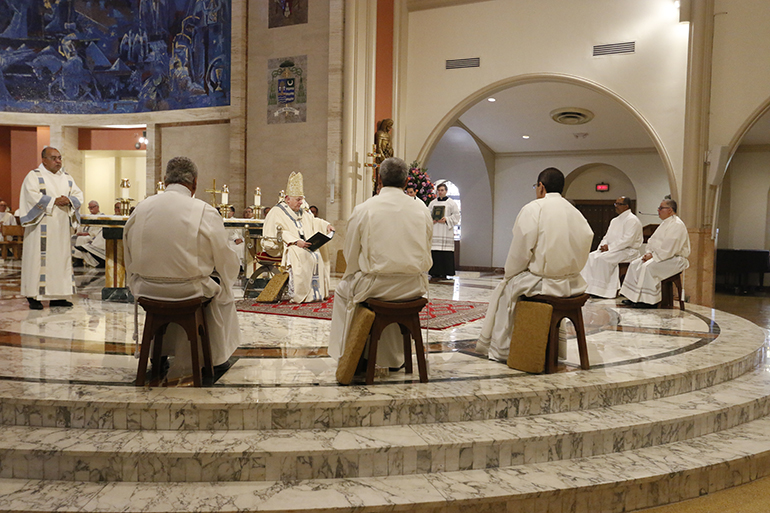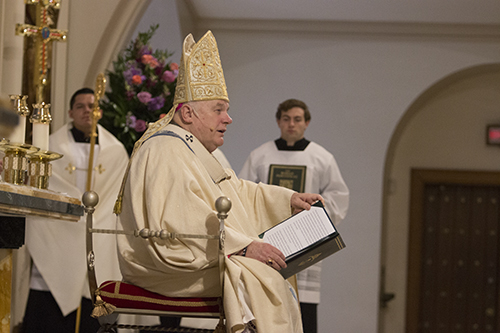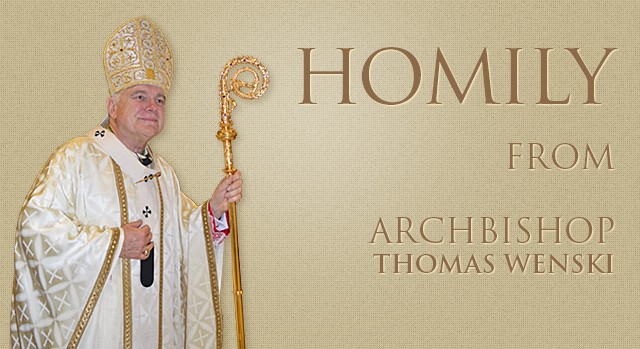By Archbishop Thomas Wenski - The Archdiocese of Miami

Photographer: ANA RODRIGUEZ-SOTO | FC
Archbishop Thomas Wenski preaches the homily at the start of the ordination rite for six new permanent deacons for Miami.
Archbishop Thomas Wenski preached this homily at the ordination of the 2017 class of permanent deacons, Dec. 16, 2017 at St. Mary Cathedral.
With the imposition of hands and the prayer of consecration the Lord will pour out the Holy Spirit upon these acolytes, and consecrate them deacons. Four of them are chosen from the ranks of mature married men. I want to thank their wives for their permission for these men to pursue this ministry and I thank them and their families for this continued support as these men assume the responsibilities of deacons. Two other men are not married and, following the law of the Church, both will also freely embrace the celibate state as a sign and a motive of pastoral charity.
My dear friends, these men receive the Sacrament of Holy Orders in the order of deacons through the “laying on of hands � in the words of the Second Vatican Council � not for the priesthood, but for the ministry.

Photographer: ANA RODRIGUEZ-SOTO | FC
Archbishop Thomas Wenski preaches the homily at the start of the ordination rite for six new permanent deacons for Miami.
Unlike priests whose identity is defined by their association with the altar, the table of sacrifice, the deacon’s identity is associated with another table. Yes, deacons assist at the altar; but they are called primarily to that other “service of the table” referred to in the Acts of the Apostles: namely, the care of the orphans and widows. The ministry of charity is at the origin of the institution of the deaconate. As co-workers with the bishop and priests, deacons should be the living and working expression of the charity of the Church. The priest, because he offers the sacrifice that is the pledge and foretaste of future glory, witnesses through his sacramental ministry to hope. The deacon, on the other hand, is to be a witness to charity.
When, shortly after the Second Vatican Council, the deaconate was restored as a permanent ministry and not just only as a transitional step towards the priesthood, it was hoped that “the service of the table” that characterized the ministry of the first deacons would be translated into a modern idiom. In other words, deacons are ordained to inspire, to promote and to help coordinate the service that the whole Church must undertake in imitation of Christ. While exercising a threefold diakonia, the service of the Word, service of the Eucharist, and service of the poor, the deacon’s major emphasis is to be on service to the poor.
Deacons, thus, have a special responsibility to identify to the Church those who are in need and particularly those who are without the power of voice at the margins of our society. Among such people, the deacon is to speak about Christ and to offer them the Church’s varied assistance. In the Church, the deacon is to speak about the needy, to articulate their needs and to inspire and mobilize the Catholic community’s response.
As deacons, you also have the duty of proclaiming the Gospel and helping the priests explain the Word of God. Today, I will entrust you with the Book of the Gospel with these words: “Receive the Gospel of Christ, whose herald you have become.” Remember it is his Gospel, not yours; it is the Word of God, not our own! As heralds, you must always speak in his name and not in your own.
As ministers of the Church, you must understand that it is the truth of the Gospel that judges events �not vice versa, as so often happens today in our current culture. By your faithful service to the Gospel in its integrity � without compromise, without accommodation, hesitation or fear � you must help the world to discover that Truth that has a human face, the Truth that is a person: Jesus Christ.
As this beautiful ordination ceremony so richly makes clear, as deacons, you are born from the Altar � from within the heart of the Eucharistic Sacrifice. You are born in prayer. For this reason, I recommend to you the Liturgy of the Hours. The Liturgy of the Hours is entrusted in a particular way to the ordained ministers of the Church. The Liturgy of the Hours belongs to you � no less than it belongs to the bishops and priests who are bound to it for their daily prayer. But the Liturgy of the Hours is rightly promoted among all the faithful. As deacons you can be instrumental in better acquainting the laity to the Liturgy of the Hours. And your own efforts to pray daily the Liturgy of the Hours can help you grow in vigor, be strengthened in faithfulness and increase your ability to serve. And, since it is a prayer offered in the Spirit to the Father in the name of Christ for the Church and for the whole world, it is itself another form of diakonia.
Mis hermanos, ustedes serán Diáconos de la Iglesia de Dios. Como tales, son ordenados para ser símbolo e instrumento de Cristo, quien vino “no para ser servido, sino para servir”.
Si podemos asociar las palabras “cristiano” y “ambición”, debe ser solamente cuando la “ambición cristiana” describe la pasión del cristiano por servir � ya que el “servicio” es el mayor llamado de todo cristiano. Hasta el Papa � quien es la figura “más alta” dentro de la jerarquía de la Iglesia � es con razón llamado el Servus servorum Dei, el Siervo de los Siervos de Dios.
Como compañeros de trabajo del Obispo y de los sacerdotes, deben ser la expresión viva y activa de la caridad de la Iglesia. A ustedes, pues, les es confiado de una manera especial el ministerio de la caridad que se encuentra en el origen de la institución de diácono.
De modo que ustedes tienen la responsabilidad especial de identificar a la Iglesia con los necesitados y, en particular, con los que carecen del poder de la voz en los márgenes de nuestra sociedad.
Mass means mission. The words of dismissal � which are given to the deacon to proclaim � “Ita, Missa est” � “Go, the Mass is ended” � originally had this connotation: “Ita Missa est” could be rendered: Go, it is the sending. We are sent into the world to bear witness to Christ and to his Gospel� so that the world might believe.


Comments from readers